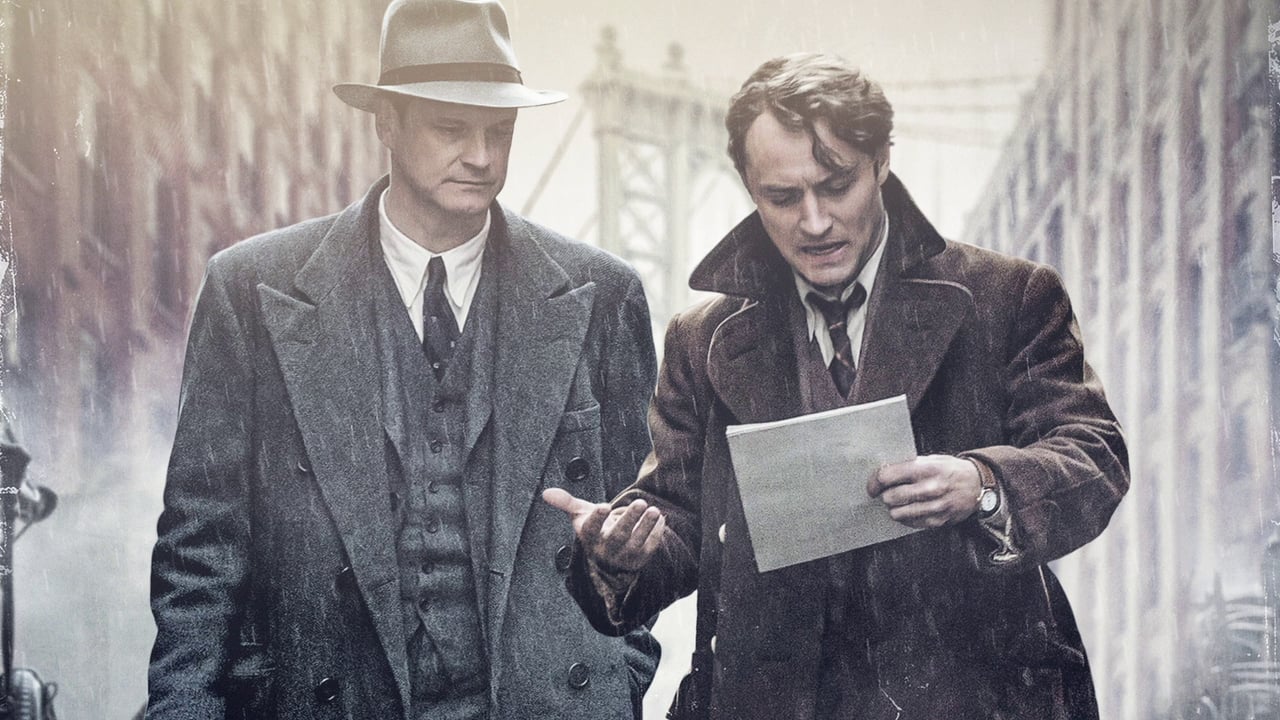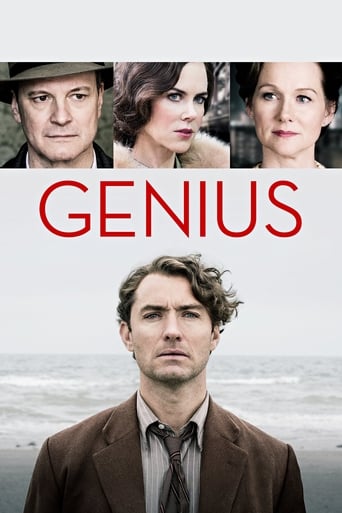

With an incredible cast of Colin Firth, Jude Law, Nicole Kidman, Guy Pearce, Laura Linney, and Dominic West, be prepared for some wonderful acting in Genius. It's a movie about the real-life editor Max Perkins who worked with famous authors, but while a few scenes touch on his relationships with F. Scott Fitzgerald and Ernest Hemingway, the majority of the film is devoted to his work with Thomas Wolfe.While there is a lot to appreciate in this movie, namely Colin Firth's emotion and Jude Law's energy, I couldn't ignore the overall feel that John Logan's script didn't quite know what direction it wanted to take. Since the film is about a very wordy writer and the quest to cut down his manuscript before publication, perhaps Logan purposely wrote his script with that tone, so that the screenplay mirrored the plot's difficulty. If it was done on purpose, it was very clever and well done. If it wasn't, then the storyline coincidentally explores many different avenues without taking the time to fully finish or flesh out any of them.There's a particular scene that I remember most vividly: Colin and Jude and working to cut down his manuscript, and a passage is read aloud about the protagonist falling in love at first sight. He describes the woman's appearance, and it's so beautifully poetic, I was almost moved to tears. At the end of the scene, Jude agrees to cut the entire description, leaving only, "Eugene saw a woman. Her eyes were blue. So quickly did he fall for her that no one in the room even heard the sound." After hearing the original prose, I was so disappointed! The scene was supposed to illustrate the fantastic working relationship between the two, and to show what a great editor Colin is, but I would have rather seen Jude's works published in its entirety, split into many volumes. The loss of such beautiful words made me lose my appetite for the rest of the film.If you're a sucker for 1930s period pieces and love the cast, you'll probably be entertained by Genius. It's not a film I want to watch again, but I do like to appreciate good acting. Although, Jude Law's over-the-top accent made me think he was faking his identity and was somehow trying to scam Colin Firth. And Guy Pearce's depressive portrayal of F. Scott Fitzgerald isn't at all how the author's fans would like to remember him, but there's always Midnight in Paris for a more likable, upbeat interpretation.
... View MoreIt's a reasonable, pleasant film. There isn't a big story, an astonishing scenario or even an amazing moment in the movie. But for those who love literature it is interesting to look at such famous writers, that quite frankly I always saw as some sort of gods, not even giving them a real image, and now seeing them as human beings, failing and being petty as they write tremendously. It is interesting to think of the process of writing that created The Great Gatsby and what follows next. It make us realize that we are just commons humans no matter what great achievements we make. There are some moments in the movie that are going to get our attention and some suspense in the middle that is well explored. Jude Law, specially, and Colin Firth are actors that know what they are doing and that helps painting the picture. Overall an average movie that can become interesting if you enjoy watching an image of great writers from the pass, but not much more than that.
... View MoreIt's not easy, in these times, to be moved and inspired by something as simple as a story in a movie...I knew nothing of Thomas Wolfe and most likely, I will not remember him long but...You understand from the writer of the movie and his perspective of Wolfe that; he understands. I felt choked up as the last words of the movie were said and yet a smile of joy crossed my face. It's seeing the beauty and magic of words and reminds us of how lucky we are to have been blessed with masters of the written word. I spent some time after watching this great movie, learning about Mr. Wolfe...He was a man not much different than many men of the early 20th century. Bold, brave, learned, articulate and driven. There are many amazing authors from the 20th century, Hemingway, Joyce, Faulkner,Fitzgerald, Salinger,DH Lawrence et al. - make it a point in your life to read as many as you may. " Better pass boldly into that other world, in the full glory of some passion, than fade and wither dismally with age." Joyce.
... View MoreAt first you think that the movie's title comes from the bombastically exuberant Thomas Wolfe, the writer who couldn't stop talking ans writing and living at his fullest, but in truth he is just another histrionic wild man who needs the straight man to keep him on the path.Great performances from all involved. Jude Law was perfect for the role. It is almost unimaginable to think that Michael Fassbender was the first choice for the film. Colin Firth was Colin Firth and Nicole Kidman played very well a tragicomic character, the person who lives at the feet of greatness, feasting on someone else's brilliance.The structure of the film was a bit formulaic, a dramatic cliché of men focused on their work while their women nag and wail, but as far as I know it may very well have been the case. It's one of those movies about crazy writers that makes you want to write yourself and to question your comfortable yet bland life.
... View More